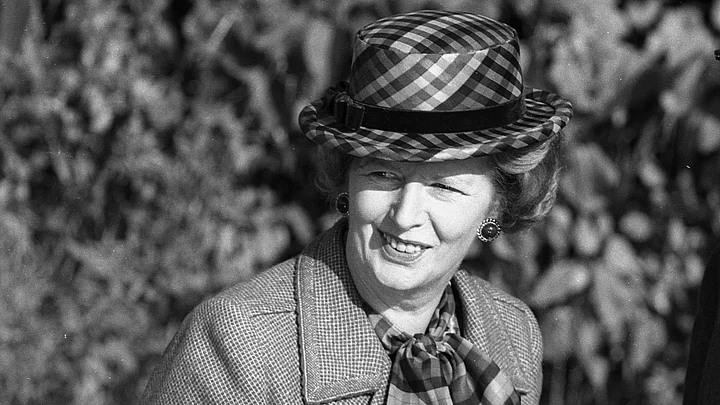(On the occasion of Margaret Thatcher’s birth anniversary, we are reposting this article from The Quint’s archives. It was originally published on 4 May 2018)
Forty years ago ago, on 4 May 1979, Margaret Thatcher was sworn in as the first female prime minister of Britain. One of the most powerful leaders of her time, Thatcher is credited with changing the course of modern British politics.
Easily the world’s most influential woman during her premiership, Thatcher was both loved and loathed for her radical economic and political initiatives.
The 2011 documentary The Lady’s Not for Turning – An Unauthorised Story on Margaret Thatcher traces the former prime minister’s journey from Parliament to prime ministership.
The 46-minute film begins with Thatcher’s first appearance outside 10 Downing Street after she won her first mandate in 1979. Quoting the prayer of St Francis, she says:
“Where there is discord, may we bring harmony;
Where there is error, may we bring truth;
Where there is doubt, may we bring faith;
And where there is despair, may we bring hope.”
Popularly called the ‘Iron Lady’, Thatcher earned the nickname for her tough stance against the then Soviet Union, which, according to her, was clamouring for world dominance.
She was given the nickname by Russian publication Red Star, which published a rebuttal of her stance. However, Thatcher took great pride in her new nickname.
Speaking about his adversary, Roy Hattersley from the Labour Party in the documentary says:
“I admire her energy, and I admire her determination… But I do not admire her intellectual method which is an incapacity for thinking that she might be wrong.”
The title of the documentary aptly borrows from Thatcher’s speech at the Conservative Party Conference in 1980, after she was elected prime minister.
“To those waiting with bated breath for that favourite media catchphrase, the “U” turn, I have only one thing to say. “You turn if you want to. The lady’s not for turning.” I say that not only to you but to our friends overseas and also to those who are not our friends.”Margaret Thatcher in her speech
Thatcher delivered the speech in the first year of her taking oath, when a bleak economic landscape stared at her after her election. In tandem with her Chancellor of Exchequer, she lowered the direct taxes while increasing indirect taxes, helping reduce the inflation rates from over 15 percent to 8 percent by 1982.
However, not everybody was happy, as unemployment rates had reached a new high since World War II – and a second shot at premiership looked bleak.
But one event played fate into Thatcher’s hands – the Falklands War.
The Falklands War
The increasing unemployment had led to growing resentment for Thatcher, despite the economic respite.
However, the Falklands War of 1982 turned the tide in Thatcher’s favour .
The military of Argentina laid siege on the Falkland Islands and South Georgia, triggering a war. However, Thatcher’s able handling of the situation led to a victory, and she was touted a ‘capable war leader.’
Needless to say, the victory also enabled her to secure a second term as prime minister in the subsequent 1983 elections.
The Miners’ Strike
In her first mandate, Thatcher also limited the powers enjoyed by trade and labour unions, as she felt that they were detrimental to the functioning of a democracy. Her decision resulted in protests and strikes by several labour unions; however, these protests soon fizzled out.
During the course of her second term, Thatcher announced the closure of at least 20 of the 174 state-owned mines, leading to a nationwide protest by coal mine workers in 1984.
This was the largest uprising the Thatcher government ever saw. The Prime Minister was, however, prepared to beat the strike, having stored fuel stocks and ensured that forces were adequately equipped to handle the strike.
This resulted in the government’s victory over the mine workers, and a year later, the strike was called off by the workers without a deal.
Assassination Attempt
The documentary also mentions the attempt on her life by the Irish Army (IRA), when she was at a Brighton hotel to attend a Conservative Party Conference. Thatcher was preparing for her speech at the conference, when the IRA bombed the section of the hotel she was staying in.
She, however, narrowly escaped injury, although the debacle killed five others, including a Conservative MP.
Despite the assassination attempt, Thatcher insisted that the conference take place as per schedule the next day. The IRA claimed responsibility of the attack the next day, going on to issue an audacious warning that a similar attack was headed Thatcher’s way.
Thatcher’s Decline
The slope in Thatcher’s popularity became increasingly visible in the 1989 party leadership elections, when her post was challenged by back-bencher MP Sir Anthony Meyer. Though Thatcher won the ballot by a clear majority, her overconfident attitude and steadfast refusal to believe in poll projections that indicated her decline, led to her downfall.
Soon after, Thatcher’s counsellor Nigel Lawson resigned and her deputy prime minister, Geoffrey Howe, followed suit, owing to differences over the European Monetary Union. By then, the scales had tipped against Thatcher, with the polls predicting a Labour Party lead.
In November that year, MP Michael Heseltine challenged Thatcher’s leadership, and won in the second ballot.
Though Thatcher reportedly announced her decision ‘to fight on and fight and win,’ a consultation with the Cabinet persuaded her to give up her post as prime minister, leading her to leave 10 Downing street in tears.
Her resignation came as a shock to many across the world, including her dear friend and former US President Ronald Reagan. Over a decade after she stepped down as prime minister, Thatcher quit politics in 2002 after a series of strokes, breathing her last in 2013.
She, however, remains one of the most controversial political figures in British history, and is credited with playing a fundamental role in shaping the nation’s course.
